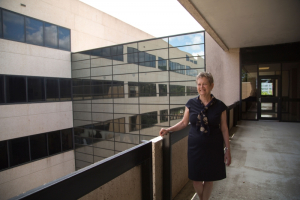Christine Ehlig-Economides joined the UH Cullen College of Engineering this fall as the William C. Miller Endowed Chair Professor of petroleum engineering – and her reputation as a world-renowned petroleum engineering educator has come along with her to the University of Houston.
Last month, Ehlig-Economides was named a winner of the 2014 SPE (Society of Petroleum Engineers) Faculty Innovative Teaching Award. The award recognizes petroleum engineering faculty who have demonstrated innovative teaching techniques in order to encourage and equip others in academia to use similar teaching methods.
Ehlig-Economides began her second stint at the University of Houston Cullen College of Engineering this fall after serving as a petroleum engineering professor at Texas A&M University for over a decade. Prior to that, she spent 20 years traveling the world as an engineer for Schlumberger. Ehlig-Economides said the decades of industry experience under her belt helped to prepare her for the next chapter of her career as a petroleum engineering educator.
The course that won Ehlig-Economides the SPE award was titled, “Energy Resources, Their Utilization and Importance to Society,” and was available as an elective course during her tenure at A&M. The class was open to all students at the university – not just engineers or other STEM majors. “Good citizens should understand energy,” Ehlig-Economides said. “So that’s how it got started.”
The overarching goal of the class was to enable non-engineers to understand the basic fundamentals about energy resources, how they are produced, how to use them with minimal adverse impact to the environment, and their local and global importance to society, Ehlig-Economides said.
Content included in the course, she added, was strongly influenced by the university’s proximity to the city of Houston, the energy capital of the world. “Look at the benefit to society,” she said. “If we’re teaching lawyers, teachers, doctors, and other future Aggies that are not necessarily engineers – individuals who may be making laws and influencing our communities – then we are providing a beneficial service to our city.”
The course consisted of a standard lecture-driven class and a discussion-oriented recitation laboratory led by undergraduate peer instructors who had previously completed the course. This method of employing undergraduate students to help engage their peers in discussions proved to be particularly effective, Ehlig-Economides said. “That is definitely something I want to carry over to my courses here at the University of Houston.”
Another innovative and effective tool for engaging students in the learning process, she said, was implementing student-generated quizzes in the course. “If the students were thinking about a good question to ask while I was teaching, then that means they’re actually engaged,” she said. “This is a teaching method that I’m currently using in my classes at UH.”
She also asked students to form a team on the first recitation day and come up with a preliminary plan for developing and marketing an energy-related product or service. The student teams were required to deliver elevator speeches to market their project idea to an experienced project manager.
“I felt really good when they did their projects at the end and presented them to their peers,” Ehlig-Economides said. “When their peers started questioning them and they were answering their questions, it was clear they had knowledge and background on the topic and were standing their ground and defending what they’ve done using energy and engineering language – then I’m thinking, ‘Yep, that’s what I’m trying to accomplish.’”
Ehlig-Economides also involved the students in the development of an electronic textbook about energy that was funded by the National Science Foundation (NSF). Working with collaborators at Pennsylvania State University, Stanford University, the University of Massachusetts – Lowell and the University of California at Long Beach, Ehlig-Economides designed the iBook specifically for her innovative energy course.
The iBook, titled “LiveEnergy,” was also inspired by the notion that high-level energy concepts aren’t just for engineers or STEM workers. Rather, all citizens can benefit from understanding energy resources, their utilization and their impact on society. Moreover, by involving individuals from a variety of different disciplines and backgrounds in energy discussions, the entire energy community can benefit.
“Traditionally, very few engineering courses are offered to non-engineers, but this was an exception,” Ehlig-Economides said. “By mixing a highly diverse student population from many different majors to study energy and energy sustainability, everyone can win.”
“This course was inspired by the conviction that sustainable energy solutions must involve all disciplines, not just engineering.”
